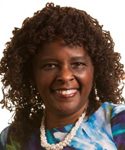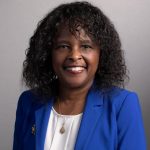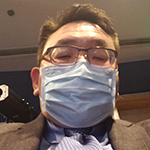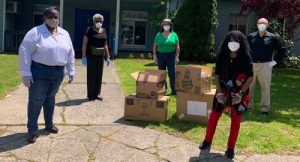
Alderwoman Honda Smith and Links members Camille Cooper, Tracey Philpot and Deborah Desir, along with Sergio Rodriguez, stand ready to deliver needed supplies to residents of Ward 30 in New Haven, Conn.
Initial efforts by Dr. Desir and her husband, other Links members and the New Haven Chapter of The Links totaled $36,000’ worth of masks and grocery gift cards. These donations helped address food insecurity exacerbated by unemployment during the pandemic. Recipients included students enrolled in New Haven Public Schools and their parents, ’r kids Family Center, Christian Community Action and others.
Dr. Desir has also written two grant proposals on behalf of the New Haven Chapter of The Links to support ongoing efforts, resulting in:
- A $20,000 grant from the Community Foundation of New Haven to support educational materials and technology, personal protective equipment and food assistance to inner city children and their families through a partnership with New Haven Public Schools and other organizations serving African American and other at risk communities; and
- A $10,000 grant from the Yale Community for New Haven Fund to support the provision of masks for children, as well as food assistance for New Haven families who have been negatively impacted by the pandemic.
In her community, Dr. Blanco and her students worked to make masks, which they delivered to local hospitals and hospitals in the greater New York City area.
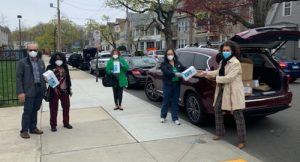
Gary Desir, Deborah Desir, Cathy Graves, Tracey Philpot and Karen DuBois-Walton unload supplies, including reusable masks for New Haven Housing Authority residents.
Taking Care of Patients
Community service is a way of life, according to Dr. Desir. “To whom much is given, much is expected,” she says. Focusing on community outreach is a natural extension of her medical practice, where section meetings include discussions of the community’s underserved populations.
“It’s difficult to separate these issues [such as food insecurity] from the fact that these are our patients,” she says. “So we take care of them.”
Physicians are leaders in their community, and they have the power to protect and advocate for their patients beyond the walls of the office. This idea harkens back to simpler times, Dr. Blanco says, when there was one town physician and everyone went to that doctor.
“We’ve become sub-specialized, but that doesn’t mean we’re not embedded and part of this broader patient community—especially rheumatologists, because you have a very long-term relationship with patients,” she says. “You become part of that patient’s support system and network—their individual community.”
